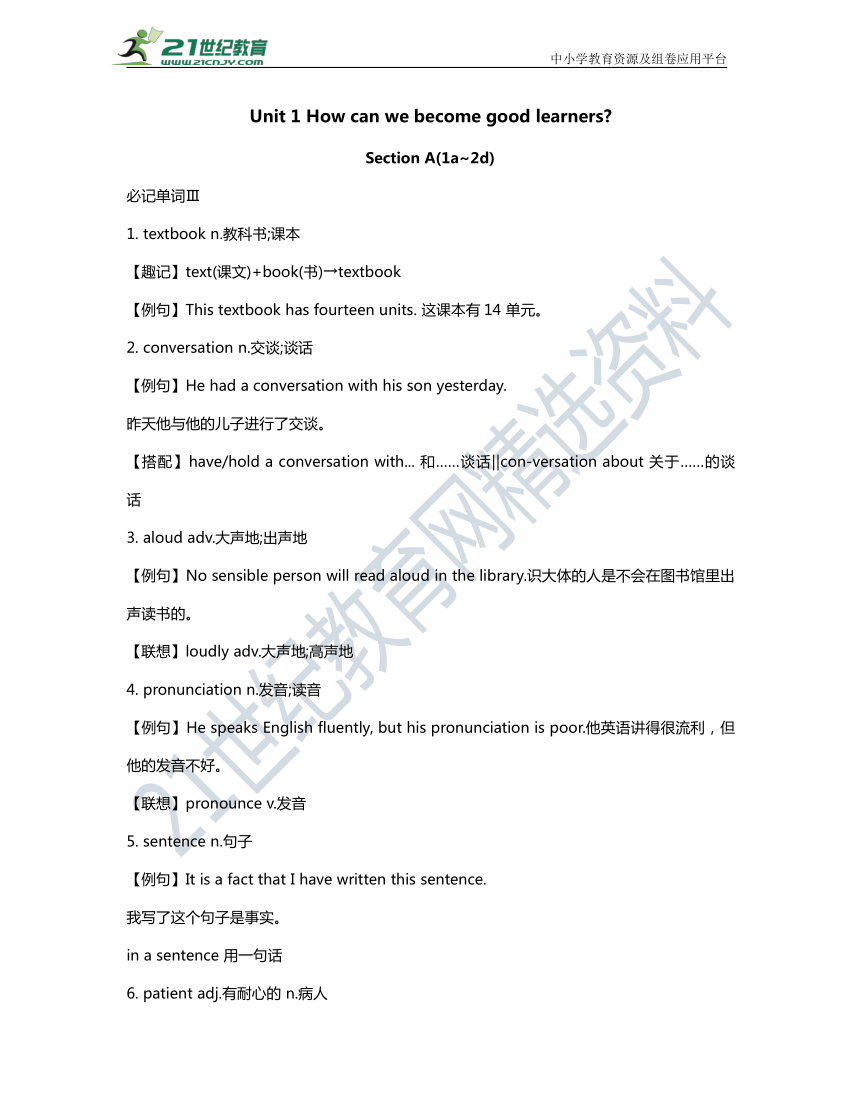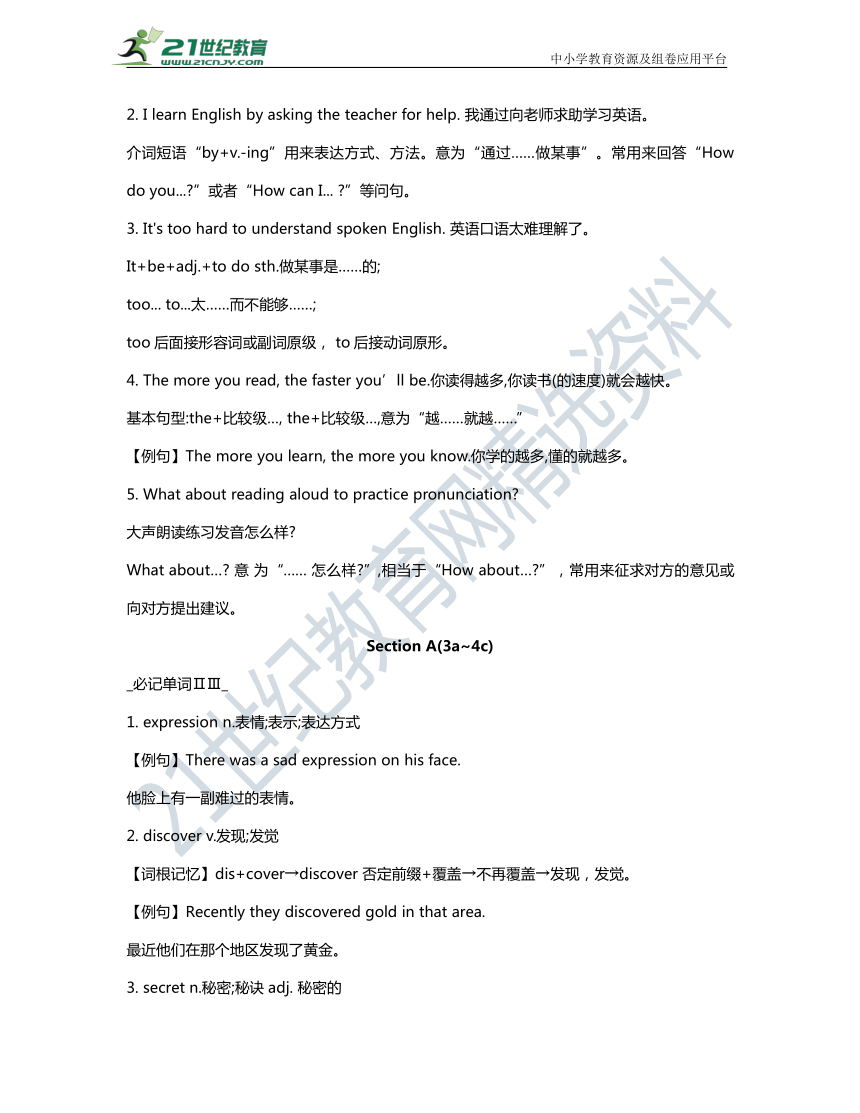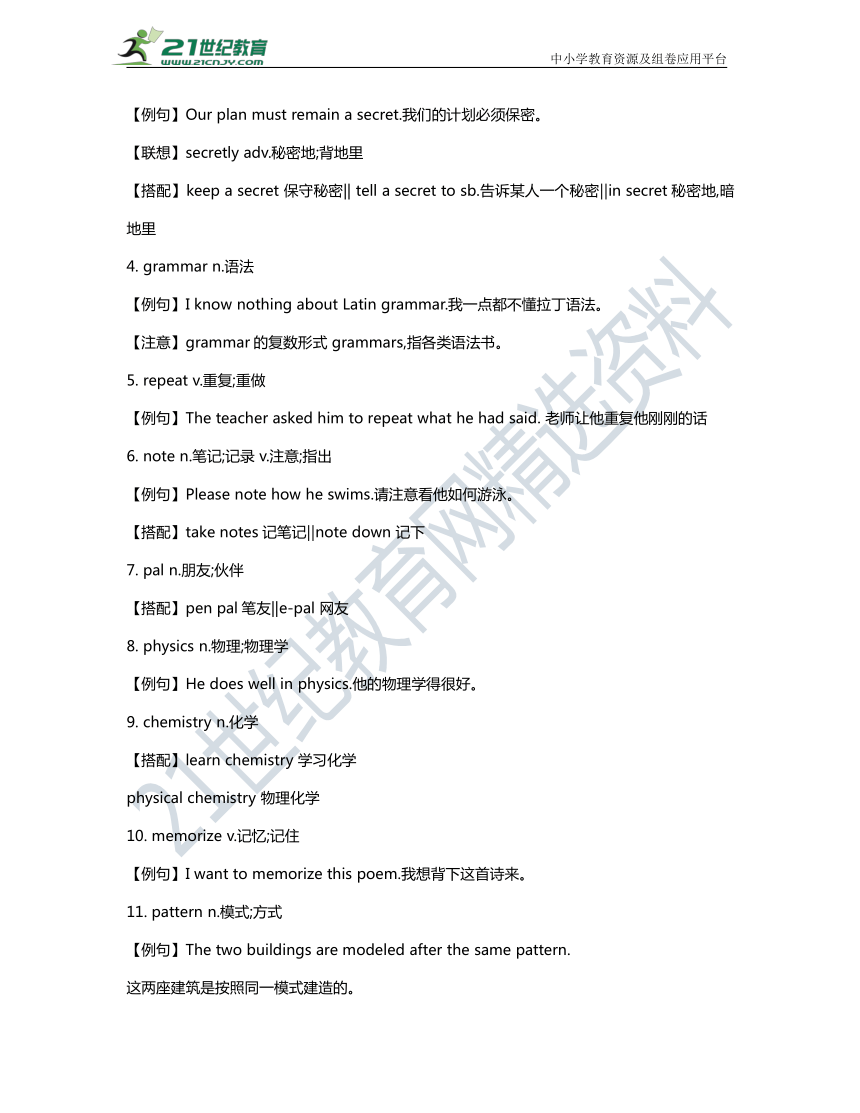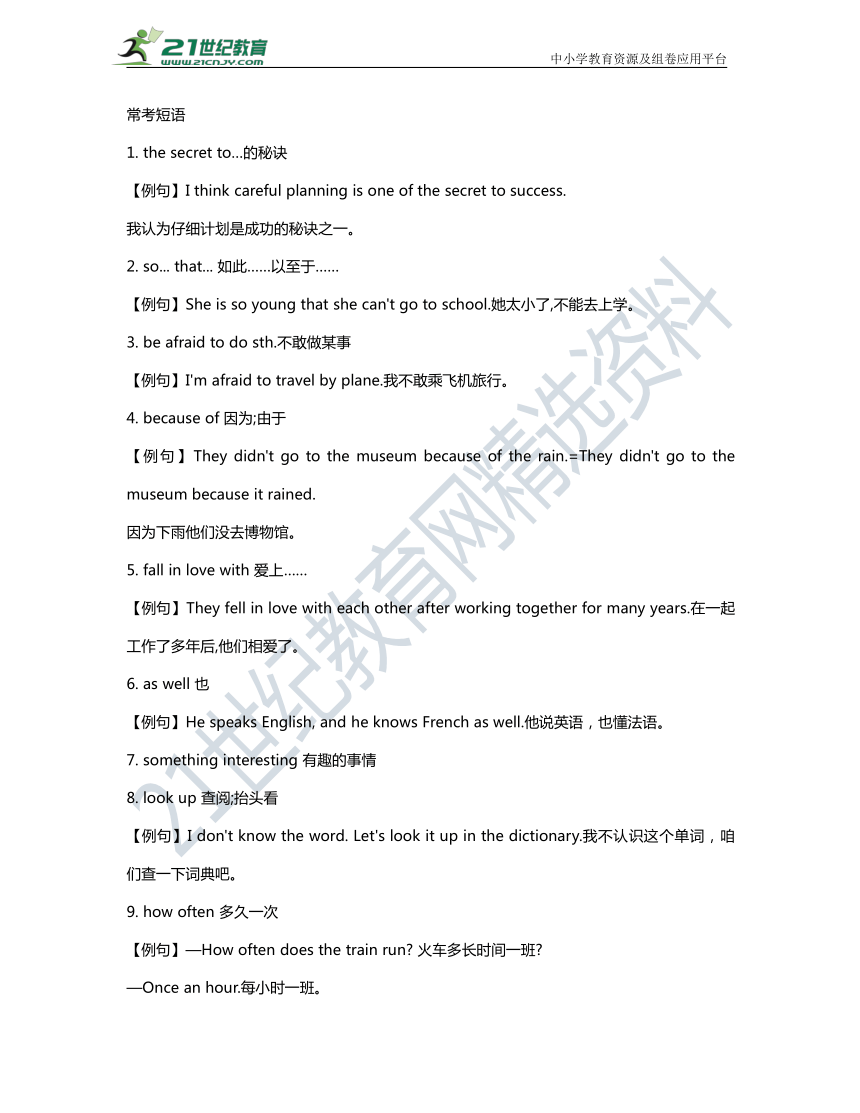Unit 1 How can we become good learners单元知识点汇总 人教版九年级英语全一册
文档属性
| 名称 | Unit 1 How can we become good learners单元知识点汇总 人教版九年级英语全一册 |  | |
| 格式 | docx | ||
| 文件大小 | 161.7KB | ||
| 资源类型 | 试卷 | ||
| 版本资源 | 人教新目标(Go for it)版 | ||
| 科目 | 英语 | ||
| 更新时间 | 2023-09-09 16:01:41 | ||
图片预览





文档简介
中小学教育资源及组卷应用平台
Unit 1 How can we become good learners
Section A(1a~2d)
必记单词Ⅲ
1. textbook n.教科书;课本
【趣记】text(课文)+book(书)→textbook
【例句】This textbook has fourteen units. 这课本有14 单元。
2. conversation n.交谈;谈话
【例句】He had a conversation with his son yesterday.
昨天他与他的儿子进行了交谈。
【搭配】have/hold a conversation with... 和……谈话‖con-versation about 关于……的谈话
3. aloud adv.大声地;出声地
【例句】No sensible person will read aloud in the library.识大体的人是不会在图书馆里出声读书的。
【联想】loudly adv.大声地;高声地
4. pronunciation n.发音;读音
【例句】He speaks English fluently, but his pronunciation is poor.他英语讲得很流利,但他的发音不好。
【联想】pronounce v.发音
5. sentence n.句子
【例句】It is a fact that I have written this sentence.
我写了这个句子是事实。
in a sentence 用一句话
6. patient adj.有耐心的 n.病人
【例句】Your patient explanation helps me a lot.你耐心的解释对我很有帮助。
【搭配】be patient with sb.对……有耐心;容忍某人
be patient of sth.忍耐某事
常考短语ⅡⅡ_
1. work with friends 和朋友一起学习
2. make word cards 制作单词卡片
3. listen to tapes 听磁带
4. study for a test 备考
5. watch videos 看录像
6. speaking skills 口语技巧
7. spoken English 英语口语
8. that way 那种方式
9. at first 起初;起先 at last 最后;终于(反义词)
【例句】At first I didn't want to go. but I soon changed my mind.最初我不想去,可是不久我改变了主意。
10. word by word 一个词一个词地;逐字地
11. a little=a bit/a little bit/kind of 一点
12. what about… 怎么样呢 相当于 how about
【例句】What about visiting the East Lake
去游览东湖怎么样
13. have conversations with 与……交谈
14. read aloud 大声朗读
经典句型|||||
1. How do you learn English 你是怎样学习英语的
2. I learn English by asking the teacher for help. 我通过向老师求助学习英语。
介词短语“by+v.-ing”用来表达方式、方法。意为“通过……做某事”。常用来回答“How do you... ”或者“How can I... ”等问句。
3. It's too hard to understand spoken English. 英语口语太难理解了。
It+be+adj.+to do sth.做某事是……的;
too... to...太……而不能够……;
too后面接形容词或副词原级, to后接动词原形。
4. The more you read, the faster you’ll be.你读得越多,你读书(的速度)就会越快。
基本句型:the+比较级…, the+比较级…,意为“越……就越……”
【例句】The more you learn, the more you know.你学的越多,懂的就越多。
5. What about reading aloud to practice pronunciation
大声朗读练习发音怎么样
What about… 意 为“…… 怎么样 ”,相当于“How about… ”,常用来征求对方的意见或向对方提出建议。
Section A(3a~4c)
_必记单词ⅡⅢ_
1. expression n.表情;表示;表达方式
【例句】There was a sad expression on his face.
他脸上有一副难过的表情。
2. discover v.发现;发觉
【词根记忆】dis+cover→discover 否定前缀+覆盖→不再覆盖→发现,发觉。
【例句】Recently they discovered gold in that area.
最近他们在那个地区发现了黄金。
3. secret n.秘密;秘诀adj. 秘密的
【例句】Our plan must remain a secret.我们的计划必须保密。
【联想】secretly adv.秘密地;背地里
【搭配】keep a secret 保守秘密|| tell a secret to sb.告诉某人一个秘密‖in secret秘密地,暗地里
4. grammar n.语法
【例句】I know nothing about Latin grammar.我一点都不懂拉丁语法。
【注意】grammar的复数形式 grammars,指各类语法书。
5. repeat v.重复;重做
【例句】The teacher asked him to repeat what he had said. 老师让他重复他刚刚的话
6. note n.笔记;记录 v.注意;指出
【例句】Please note how he swims.请注意看他如何游泳。
【搭配】take notes记笔记‖note down 记下
7. pal n.朋友;伙伴
【搭配】pen pal笔友||e-pal 网友
8. physics n.物理;物理学
【例句】He does well in physics.他的物理学得很好。
9. chemistry n.化学
【搭配】learn chemistry学习化学
physical chemistry 物理化学
10. memorize v.记忆;记住
【例句】I want to memorize this poem.我想背下这首诗来。
11. pattern n.模式;方式
【例句】The two buildings are modeled after the same pattern.
这两座建筑是按照同一模式建造的。
常考短语
1. the secret to…的秘诀
【例句】I think careful planning is one of the secret to success.
我认为仔细计划是成功的秘诀之一。
2. so... that... 如此……以至于……
【例句】She is so young that she can't go to school.她太小了,不能去上学。
3. be afraid to do sth.不敢做某事
【例句】I'm afraid to travel by plane.我不敢乘飞机旅行。
4. because of 因为;由于
【例句】They didn't go to the museum because of the rain.=They didn't go to the museum because it rained.
因为下雨他们没去博物馆。
5. fall in love with 爱上……
【例句】They fell in love with each other after working together for many years.在一起工作了多年后,他们相爱了。
6. as well 也
【例句】He speaks English, and he knows French as well.他说英语,也懂法语。
7. something interesting 有趣的事情
8. look up 查阅;抬头看
【例句】I don't know the word. Let's look it up in the dictionary.我不认识这个单词,咱们查一下词典吧。
9. how often 多久一次
【例句】—How often does the train run 火车多长时间一班
—Once an hour.每小时一班。
10. repeat out loud 大声重复
11. take notes做/记笔记
【例句】You’d better take notes in class. 你最好在课堂上记笔记。
12. write emails to sb.写电子邮件给某人
13. memorize sentence patterns 记句型
_经典句型_||||_
1. Why did Wei Fen find it difficult to learn English 为么魏芬觉得学英语困难呢
find it+形容词+to do sth.意为“发现做某事是……的”。其中it为形式宾语,真正的宾语是后面的不定式。句中形容词为宾语补足语。
类似的结构有:make it+形容词+to do sth.使做某事是……的
think it+形容词+to do sth.认为做某事是……的
【例句】I found it very interesting to learn English.
我发现学英语很有趣。
2. How often do you do them 你多久做一次语法练习
how often 意为“多久一次”,用于询问频率。常用 never,always, often等表示频度的副词或“once/twice...(表示次数的)副词+时间段”等来回答。
【例句】—How often do you exercise 你多久锻炼一次
—Once a day.每天一次。
Section B(1a~1e)
_必记单词‖训
1. pronounce v. 发音
【例句】I don't know how to pronounce this word.
我不知道这个单词怎么发音。
【联想】pronunciation n.发音
2. increase v.增加;增长
【例句】Increase in population caused a shortage of food.
人口增加导致粮食短缺。
【搭配】increase by 增加了;按……增长
increase to…增长到……
3. speed n.速度
【例句】Few cars can equal this kind of car for speed.
很少有其他车在速度方面胜过这种车。
【搭配】at a speed of... 以……速度
4. partner n.搭档;同伴
【例句】My partner for the event was the marvellous American player.那场比赛我的搭档是那位了不起的美国选手。
_常考短语ⅡⅡ_
1. make mistakes 犯错误
【例句】I used to make mistakes in spelling.
我过去常犯拼写错误。
2. have a partner to practice English with 有练习英语的伙伴
3. not always 不一定总是;未必总是
【例句】Those who have a lot of money are not always happy.
有钱人不一定总是幸福。
4. get... right 使……正确;纠正
5. join an English club 加入英语俱乐部
_经典句型_||||_
1. I don't know how to increase my reading speed.我不知怎样提高我的阅读速度。
“how to increase my reading speed”是“疑问词+动词不定式”
结构,在句中作know 的宾语。“疑问词+动词不定式”这种结构在句中可作主语、宾语、表语等成分。
to have the meeting.我们不知道什么时候开会。
Section B(2a~3b)
必记单词Ⅲ
1. born v.出生 adj.天生的
【例句】He was born in Beijing on October 9th,1998.
他于1998年10月9日在北京出生。
【搭配】be born in...出生于某地
be born on...出生于某天
2. ability n.能力;才能
【例句】He has the ability to speak English fluently.
他能够流利地说英语。
3. create v.创造;创建
【例句】An artist should create beautiful things.一个艺术家应该创造美丽的东西。
【联想】creation n.创造,创作
4. brain n.大脑
【例句】His brain seems to be functioning normally.
他的大脑看起来功能正常。
5. active adj.活跃的;积极的
【词根记忆】act+-ive→active
行动+形容词后缀→活跃的;积极的
【例句】Ms. Brown is active in the party.布朗女士在晚会上很活跃。
【搭配】be active in在……方面积极‖take an active part in积极参加
6. attention n.注意;关注
【例句】You should pay attention to your spelling.
你应注意你的拼写。
【搭配】turn one's attention to sb./sth.将注意力转移到某人/某物||pay attention to注意
7. connect v.(使)连接;与……有联系
【例句】A railway connects Beijing with Shanghai.
北京和上海之间有铁路相连。
【搭配】connect to使与……连接
connect with sth. 与……连接
8. overnight adv.一夜之间;在夜间
【例句】The city was conquered overnight.那座城市在夜里被攻克。
9. review v.& n.回顾;复习
【趣记】re(再)+view(观察)→再观察→review
【例句】Perhaps we need a quick review of what we've gone
through so far.或许我们应很快地回顾一下我们前一段时间的工作。
【拓展】pre view v.预习
10. knowledge n.知识;学问
【例句】My knowledge of French is poor. 我对法语所知有限。
【搭配】broad knowledge 广博
common knowledge常识
11. lifelong adj.终身的;毕生的
【词根记忆】life+long→lifelong
一生+长→和一生一样长→终身的
【例句】Make gratitude a lifelong habit.让感谢成为终身的习惯。
【搭配】lifelong learning 终身学习;终生学习
12. wisely adv.明智地;聪明地
【联想】wisc adj.明智的;聪明的
_常考短语_||||_
1. be born with the ability 天生具有能力
2. learning habits 学习习惯
3. in common 共有的
4. be interested in 对……感兴趣
【例句】Are you interested in learning English 你对学英语感兴趣吗
5. pay attention to 注意;关注
【例句】You'd better pay attention to this word. It appeared inthe last English exam.你最好关注一下这个单词,它在上次英语考试中出现过。
6. connect... with... 把······和······连接或联系起来
【例句】Please don't connect this thing with that one.请不要把这件事与那种事情联系在一起。
7. get bored 感到厌倦/无聊
【例句】Some students usually get bored in history class.一些学生通常在历史课上感到厌倦。
8. be good at擅长
【例句】He is good at swimming. =He does well in swimming.
他擅长游泳。
9. even if 即使
【例句】Even if you work till midnight, you won't finish it.即使工作到半夜,你也完成不了它。
10. keep doing sth.一直做某事
【例句】Why do you keep laughing all the time 你为什么一直在大笑
11. look for 寻找
【例句】I can't find my pen. I'm looking for it everywhere.我找不到我的钢笔了,我正在到处找它。
12. find out 弄清;查明
【例句】Read the passage, and find out the answer to this question.读这篇文章,弄清这个问题的答案。
13. on one's own独自地
【例句】Can you finish the work on your own 你能独自完成这项工作吗?
_经典句型_
1. Studies show that if you are interested in something,your brain is more active and it is also easier for you to
pay attention to it for a long time.研究显示:如果你对某物感兴趣,你的大脑会更活跃,并且你也更容易长时间关注它。
句型“It is+形容词+for sb. to do sth.”意为“对某人来说做某事是……的”。在这一句型中, it作形式主语,真正的主语是后面的动词不定式,其中 for sb.中的sb.是动词不定式的逻辑主语。
◆It is+adj.(important、interesting、necessary等事物性质类)+for sb. to do sth.
【例句】It's necessary for us to develope good learning habits.
对我们来说,养成良好的学习习惯是很有必要的。
◆It is+adj.(kind、nice、wise、stupid等人的心理品质类)+of+sb.+to do sth.
【例句】It's very nice of you to help me.你能帮我真是太好了。
2. Even if you learn something well, you will forget it un-
less you use it.即使有些东西你学得很好,除非使用它,否则你也会遗忘。
(1) even if意为“即使;虽然”,有退一步设想的意味,用来引导让步状语从句,相当于even though。
【例句】Even if you work till midnight, you won't finish it.即使工作到半夜,你也完不成它。
(2) unless 连词,意为“除非;如果不”,引导条件状语从句,相当于if... not,在许多情况下二者可互换。
【例句】Don't come unless I telephone you.=Don't come if I don't telephone you.如果我不给你打电话,你就不要来。
单元语法
一、by的用法
1.表示做某事的方式、方法等,“by+v.-ing”形式表示“用……手段或方式”,其后也可接名词,表示“借助……手段”。
I study English by listening to the tapes.我是通过听磁带的方法学习英语的。
2.“by+名词”也可表达“通过某种方式”.此结构中,在表示交通工具的bus, train, taxi. plane, ship 等名词前不必加任何冠词。
I go to school by bus every day.我每天坐公共汽车去上学。
3. by 表示“在……旁边”。
The teacher is standing by the window.老师正靠窗站着。
4. by 表示“不晚于;在……之前”。
Can you finish your homework by eight o’clock 你能在八点钟之前完成家庭作业吗
5. by 也常用于被动语态,表示“被,由”,用于引出原主动语态的主语。
The book was written by Mo Yan.这本书是由莫言写的。
6. by 与反身代词 oneself 连用,构成 by oneself“独自;单独”。
I can't leave her by herself.我不能把她单独留下。
【辨析】by, with, in 表示“用”的区别:
①by表示“使用某种方式、方法”。
He makes a living by singing.他以卖唱为生。
②with表示“使用某种工具或身体某个器官”,主语为人。
He writes with his feet.他用脚写字。
③in表示“使用语言、颜色、语调等”。
Can you answer the question in Japanese 你能用日语回答这个问题吗
二、how 引导的特殊疑问句
1. how用来询问方式和手段。
—How do you learn English 你怎样学习英语
—I learn English by studying with my friends. 我通过和朋友一起来学习英语。
—How do you go to school 你怎样去学校
—By bike.骑自行车。
2. how 用于彼此间打招呼、问候,询问身体状况。
—How do you do 你好。
—How do you do 你好。
3. how用于询问天气或程度。
—How is the weather today 今天的天气怎么样
—It's fine. 天气晴朗。
4.询问年龄时用 how old。
—How old are you 你多大了
—I'm thirteen years old.我 13岁。
5.征求对某人、某物或某问题的看法及意见时用 how about。
how about 后接名词、代词或动名词形式。
How about playing basketball 打篮球怎么样
6.询问物体的重量时用how heavy。
—How heavy is the box 这个箱子有多重
—It's 5 kilos(heavy).五千克(重)。
7.询问高度用 how tall/high。
—How tall is that tree 那棵树多高
—It's about 2 mctrcs.大约两米高。
三、动名词的用法
1.动名词在句中作主语
动名词作主语时,谓语动词用第三人称单数形式。可以用 it作形式主语,将动名词改为动词不定式,作真正的主语。
Eating too much is bad for your health. =It is bad for your health to eat too much.
吃得太多对你的身体不好。
2.动名词在句中作宾语
动名词在句中作宾语时,一般放在某一及物动词或介词之后充当这一动词或介词的宾语。后跟动名词作宾语的动词或短语
有: finish, enjoy, keep, stand, suggest, advise, practice,allow, mind, imaginc, how about, thanks for, feel like, be interested in等。
It's kind of hot. Do you mind opening the window
天气有点儿热。你介意打开窗户吗
They are interested in drawing pictures.他们对画画很感兴趣。
3.动名词在句中作表语
动名词在句中作表语时,句子主语常是表示无生命的事物的名词或what 引导的名词性从句。
What you should do next is studying for the test.
你接下来要做的就是备考。
Unit 1 How can we become good learners
Section A(1a~2d)
必记单词Ⅲ
1. textbook n.教科书;课本
【趣记】text(课文)+book(书)→textbook
【例句】This textbook has fourteen units. 这课本有14 单元。
2. conversation n.交谈;谈话
【例句】He had a conversation with his son yesterday.
昨天他与他的儿子进行了交谈。
【搭配】have/hold a conversation with... 和……谈话‖con-versation about 关于……的谈话
3. aloud adv.大声地;出声地
【例句】No sensible person will read aloud in the library.识大体的人是不会在图书馆里出声读书的。
【联想】loudly adv.大声地;高声地
4. pronunciation n.发音;读音
【例句】He speaks English fluently, but his pronunciation is poor.他英语讲得很流利,但他的发音不好。
【联想】pronounce v.发音
5. sentence n.句子
【例句】It is a fact that I have written this sentence.
我写了这个句子是事实。
in a sentence 用一句话
6. patient adj.有耐心的 n.病人
【例句】Your patient explanation helps me a lot.你耐心的解释对我很有帮助。
【搭配】be patient with sb.对……有耐心;容忍某人
be patient of sth.忍耐某事
常考短语ⅡⅡ_
1. work with friends 和朋友一起学习
2. make word cards 制作单词卡片
3. listen to tapes 听磁带
4. study for a test 备考
5. watch videos 看录像
6. speaking skills 口语技巧
7. spoken English 英语口语
8. that way 那种方式
9. at first 起初;起先 at last 最后;终于(反义词)
【例句】At first I didn't want to go. but I soon changed my mind.最初我不想去,可是不久我改变了主意。
10. word by word 一个词一个词地;逐字地
11. a little=a bit/a little bit/kind of 一点
12. what about… 怎么样呢 相当于 how about
【例句】What about visiting the East Lake
去游览东湖怎么样
13. have conversations with 与……交谈
14. read aloud 大声朗读
经典句型|||||
1. How do you learn English 你是怎样学习英语的
2. I learn English by asking the teacher for help. 我通过向老师求助学习英语。
介词短语“by+v.-ing”用来表达方式、方法。意为“通过……做某事”。常用来回答“How do you... ”或者“How can I... ”等问句。
3. It's too hard to understand spoken English. 英语口语太难理解了。
It+be+adj.+to do sth.做某事是……的;
too... to...太……而不能够……;
too后面接形容词或副词原级, to后接动词原形。
4. The more you read, the faster you’ll be.你读得越多,你读书(的速度)就会越快。
基本句型:the+比较级…, the+比较级…,意为“越……就越……”
【例句】The more you learn, the more you know.你学的越多,懂的就越多。
5. What about reading aloud to practice pronunciation
大声朗读练习发音怎么样
What about… 意 为“…… 怎么样 ”,相当于“How about… ”,常用来征求对方的意见或向对方提出建议。
Section A(3a~4c)
_必记单词ⅡⅢ_
1. expression n.表情;表示;表达方式
【例句】There was a sad expression on his face.
他脸上有一副难过的表情。
2. discover v.发现;发觉
【词根记忆】dis+cover→discover 否定前缀+覆盖→不再覆盖→发现,发觉。
【例句】Recently they discovered gold in that area.
最近他们在那个地区发现了黄金。
3. secret n.秘密;秘诀adj. 秘密的
【例句】Our plan must remain a secret.我们的计划必须保密。
【联想】secretly adv.秘密地;背地里
【搭配】keep a secret 保守秘密|| tell a secret to sb.告诉某人一个秘密‖in secret秘密地,暗地里
4. grammar n.语法
【例句】I know nothing about Latin grammar.我一点都不懂拉丁语法。
【注意】grammar的复数形式 grammars,指各类语法书。
5. repeat v.重复;重做
【例句】The teacher asked him to repeat what he had said. 老师让他重复他刚刚的话
6. note n.笔记;记录 v.注意;指出
【例句】Please note how he swims.请注意看他如何游泳。
【搭配】take notes记笔记‖note down 记下
7. pal n.朋友;伙伴
【搭配】pen pal笔友||e-pal 网友
8. physics n.物理;物理学
【例句】He does well in physics.他的物理学得很好。
9. chemistry n.化学
【搭配】learn chemistry学习化学
physical chemistry 物理化学
10. memorize v.记忆;记住
【例句】I want to memorize this poem.我想背下这首诗来。
11. pattern n.模式;方式
【例句】The two buildings are modeled after the same pattern.
这两座建筑是按照同一模式建造的。
常考短语
1. the secret to…的秘诀
【例句】I think careful planning is one of the secret to success.
我认为仔细计划是成功的秘诀之一。
2. so... that... 如此……以至于……
【例句】She is so young that she can't go to school.她太小了,不能去上学。
3. be afraid to do sth.不敢做某事
【例句】I'm afraid to travel by plane.我不敢乘飞机旅行。
4. because of 因为;由于
【例句】They didn't go to the museum because of the rain.=They didn't go to the museum because it rained.
因为下雨他们没去博物馆。
5. fall in love with 爱上……
【例句】They fell in love with each other after working together for many years.在一起工作了多年后,他们相爱了。
6. as well 也
【例句】He speaks English, and he knows French as well.他说英语,也懂法语。
7. something interesting 有趣的事情
8. look up 查阅;抬头看
【例句】I don't know the word. Let's look it up in the dictionary.我不认识这个单词,咱们查一下词典吧。
9. how often 多久一次
【例句】—How often does the train run 火车多长时间一班
—Once an hour.每小时一班。
10. repeat out loud 大声重复
11. take notes做/记笔记
【例句】You’d better take notes in class. 你最好在课堂上记笔记。
12. write emails to sb.写电子邮件给某人
13. memorize sentence patterns 记句型
_经典句型_||||_
1. Why did Wei Fen find it difficult to learn English 为么魏芬觉得学英语困难呢
find it+形容词+to do sth.意为“发现做某事是……的”。其中it为形式宾语,真正的宾语是后面的不定式。句中形容词为宾语补足语。
类似的结构有:make it+形容词+to do sth.使做某事是……的
think it+形容词+to do sth.认为做某事是……的
【例句】I found it very interesting to learn English.
我发现学英语很有趣。
2. How often do you do them 你多久做一次语法练习
how often 意为“多久一次”,用于询问频率。常用 never,always, often等表示频度的副词或“once/twice...(表示次数的)副词+时间段”等来回答。
【例句】—How often do you exercise 你多久锻炼一次
—Once a day.每天一次。
Section B(1a~1e)
_必记单词‖训
1. pronounce v. 发音
【例句】I don't know how to pronounce this word.
我不知道这个单词怎么发音。
【联想】pronunciation n.发音
2. increase v.增加;增长
【例句】Increase in population caused a shortage of food.
人口增加导致粮食短缺。
【搭配】increase by 增加了;按……增长
increase to…增长到……
3. speed n.速度
【例句】Few cars can equal this kind of car for speed.
很少有其他车在速度方面胜过这种车。
【搭配】at a speed of... 以……速度
4. partner n.搭档;同伴
【例句】My partner for the event was the marvellous American player.那场比赛我的搭档是那位了不起的美国选手。
_常考短语ⅡⅡ_
1. make mistakes 犯错误
【例句】I used to make mistakes in spelling.
我过去常犯拼写错误。
2. have a partner to practice English with 有练习英语的伙伴
3. not always 不一定总是;未必总是
【例句】Those who have a lot of money are not always happy.
有钱人不一定总是幸福。
4. get... right 使……正确;纠正
5. join an English club 加入英语俱乐部
_经典句型_||||_
1. I don't know how to increase my reading speed.我不知怎样提高我的阅读速度。
“how to increase my reading speed”是“疑问词+动词不定式”
结构,在句中作know 的宾语。“疑问词+动词不定式”这种结构在句中可作主语、宾语、表语等成分。
to have the meeting.我们不知道什么时候开会。
Section B(2a~3b)
必记单词Ⅲ
1. born v.出生 adj.天生的
【例句】He was born in Beijing on October 9th,1998.
他于1998年10月9日在北京出生。
【搭配】be born in...出生于某地
be born on...出生于某天
2. ability n.能力;才能
【例句】He has the ability to speak English fluently.
他能够流利地说英语。
3. create v.创造;创建
【例句】An artist should create beautiful things.一个艺术家应该创造美丽的东西。
【联想】creation n.创造,创作
4. brain n.大脑
【例句】His brain seems to be functioning normally.
他的大脑看起来功能正常。
5. active adj.活跃的;积极的
【词根记忆】act+-ive→active
行动+形容词后缀→活跃的;积极的
【例句】Ms. Brown is active in the party.布朗女士在晚会上很活跃。
【搭配】be active in在……方面积极‖take an active part in积极参加
6. attention n.注意;关注
【例句】You should pay attention to your spelling.
你应注意你的拼写。
【搭配】turn one's attention to sb./sth.将注意力转移到某人/某物||pay attention to注意
7. connect v.(使)连接;与……有联系
【例句】A railway connects Beijing with Shanghai.
北京和上海之间有铁路相连。
【搭配】connect to使与……连接
connect with sth. 与……连接
8. overnight adv.一夜之间;在夜间
【例句】The city was conquered overnight.那座城市在夜里被攻克。
9. review v.& n.回顾;复习
【趣记】re(再)+view(观察)→再观察→review
【例句】Perhaps we need a quick review of what we've gone
through so far.或许我们应很快地回顾一下我们前一段时间的工作。
【拓展】pre view v.预习
10. knowledge n.知识;学问
【例句】My knowledge of French is poor. 我对法语所知有限。
【搭配】broad knowledge 广博
common knowledge常识
11. lifelong adj.终身的;毕生的
【词根记忆】life+long→lifelong
一生+长→和一生一样长→终身的
【例句】Make gratitude a lifelong habit.让感谢成为终身的习惯。
【搭配】lifelong learning 终身学习;终生学习
12. wisely adv.明智地;聪明地
【联想】wisc adj.明智的;聪明的
_常考短语_||||_
1. be born with the ability 天生具有能力
2. learning habits 学习习惯
3. in common 共有的
4. be interested in 对……感兴趣
【例句】Are you interested in learning English 你对学英语感兴趣吗
5. pay attention to 注意;关注
【例句】You'd better pay attention to this word. It appeared inthe last English exam.你最好关注一下这个单词,它在上次英语考试中出现过。
6. connect... with... 把······和······连接或联系起来
【例句】Please don't connect this thing with that one.请不要把这件事与那种事情联系在一起。
7. get bored 感到厌倦/无聊
【例句】Some students usually get bored in history class.一些学生通常在历史课上感到厌倦。
8. be good at擅长
【例句】He is good at swimming. =He does well in swimming.
他擅长游泳。
9. even if 即使
【例句】Even if you work till midnight, you won't finish it.即使工作到半夜,你也完成不了它。
10. keep doing sth.一直做某事
【例句】Why do you keep laughing all the time 你为什么一直在大笑
11. look for 寻找
【例句】I can't find my pen. I'm looking for it everywhere.我找不到我的钢笔了,我正在到处找它。
12. find out 弄清;查明
【例句】Read the passage, and find out the answer to this question.读这篇文章,弄清这个问题的答案。
13. on one's own独自地
【例句】Can you finish the work on your own 你能独自完成这项工作吗?
_经典句型_
1. Studies show that if you are interested in something,your brain is more active and it is also easier for you to
pay attention to it for a long time.研究显示:如果你对某物感兴趣,你的大脑会更活跃,并且你也更容易长时间关注它。
句型“It is+形容词+for sb. to do sth.”意为“对某人来说做某事是……的”。在这一句型中, it作形式主语,真正的主语是后面的动词不定式,其中 for sb.中的sb.是动词不定式的逻辑主语。
◆It is+adj.(important、interesting、necessary等事物性质类)+for sb. to do sth.
【例句】It's necessary for us to develope good learning habits.
对我们来说,养成良好的学习习惯是很有必要的。
◆It is+adj.(kind、nice、wise、stupid等人的心理品质类)+of+sb.+to do sth.
【例句】It's very nice of you to help me.你能帮我真是太好了。
2. Even if you learn something well, you will forget it un-
less you use it.即使有些东西你学得很好,除非使用它,否则你也会遗忘。
(1) even if意为“即使;虽然”,有退一步设想的意味,用来引导让步状语从句,相当于even though。
【例句】Even if you work till midnight, you won't finish it.即使工作到半夜,你也完不成它。
(2) unless 连词,意为“除非;如果不”,引导条件状语从句,相当于if... not,在许多情况下二者可互换。
【例句】Don't come unless I telephone you.=Don't come if I don't telephone you.如果我不给你打电话,你就不要来。
单元语法
一、by的用法
1.表示做某事的方式、方法等,“by+v.-ing”形式表示“用……手段或方式”,其后也可接名词,表示“借助……手段”。
I study English by listening to the tapes.我是通过听磁带的方法学习英语的。
2.“by+名词”也可表达“通过某种方式”.此结构中,在表示交通工具的bus, train, taxi. plane, ship 等名词前不必加任何冠词。
I go to school by bus every day.我每天坐公共汽车去上学。
3. by 表示“在……旁边”。
The teacher is standing by the window.老师正靠窗站着。
4. by 表示“不晚于;在……之前”。
Can you finish your homework by eight o’clock 你能在八点钟之前完成家庭作业吗
5. by 也常用于被动语态,表示“被,由”,用于引出原主动语态的主语。
The book was written by Mo Yan.这本书是由莫言写的。
6. by 与反身代词 oneself 连用,构成 by oneself“独自;单独”。
I can't leave her by herself.我不能把她单独留下。
【辨析】by, with, in 表示“用”的区别:
①by表示“使用某种方式、方法”。
He makes a living by singing.他以卖唱为生。
②with表示“使用某种工具或身体某个器官”,主语为人。
He writes with his feet.他用脚写字。
③in表示“使用语言、颜色、语调等”。
Can you answer the question in Japanese 你能用日语回答这个问题吗
二、how 引导的特殊疑问句
1. how用来询问方式和手段。
—How do you learn English 你怎样学习英语
—I learn English by studying with my friends. 我通过和朋友一起来学习英语。
—How do you go to school 你怎样去学校
—By bike.骑自行车。
2. how 用于彼此间打招呼、问候,询问身体状况。
—How do you do 你好。
—How do you do 你好。
3. how用于询问天气或程度。
—How is the weather today 今天的天气怎么样
—It's fine. 天气晴朗。
4.询问年龄时用 how old。
—How old are you 你多大了
—I'm thirteen years old.我 13岁。
5.征求对某人、某物或某问题的看法及意见时用 how about。
how about 后接名词、代词或动名词形式。
How about playing basketball 打篮球怎么样
6.询问物体的重量时用how heavy。
—How heavy is the box 这个箱子有多重
—It's 5 kilos(heavy).五千克(重)。
7.询问高度用 how tall/high。
—How tall is that tree 那棵树多高
—It's about 2 mctrcs.大约两米高。
三、动名词的用法
1.动名词在句中作主语
动名词作主语时,谓语动词用第三人称单数形式。可以用 it作形式主语,将动名词改为动词不定式,作真正的主语。
Eating too much is bad for your health. =It is bad for your health to eat too much.
吃得太多对你的身体不好。
2.动名词在句中作宾语
动名词在句中作宾语时,一般放在某一及物动词或介词之后充当这一动词或介词的宾语。后跟动名词作宾语的动词或短语
有: finish, enjoy, keep, stand, suggest, advise, practice,allow, mind, imaginc, how about, thanks for, feel like, be interested in等。
It's kind of hot. Do you mind opening the window
天气有点儿热。你介意打开窗户吗
They are interested in drawing pictures.他们对画画很感兴趣。
3.动名词在句中作表语
动名词在句中作表语时,句子主语常是表示无生命的事物的名词或what 引导的名词性从句。
What you should do next is studying for the test.
你接下来要做的就是备考。
同课章节目录
- Unit 1 How can we become good learners.
- Section A
- Section B
- Unit 2 I think that mooncakes are delicious!
- Section A
- Section B
- Unit 3 Could you please tell me where the restroom
- Section A
- Section B
- Unit 4 I used to be afraid of the dark.
- Section A
- Section B
- Unit 5 What are the shirts made of?
- Section A
- Section B
- Review of Units 1-5
- Unit 6 When was it invented?
- Section A
- Section B
- Unit 7 Teenagers should be allowed to choose their
- Section A
- Section B
- Unit 8 It must belong to Carla.
- Section A
- Section B
- Unit 9 I like music that I can dance to.
- Section A
- Section B
- Unit 10 You're supposed to shake hands.
- Section A
- Section B
- Review of Units 6-10
- Unit 11 Sad movies make me cry.
- Section A
- Section B
- Unit 12 Life is full of the unexpected
- Section A
- Section B
- Unit 13 We're trying to save the earth!
- Section A
- Section B
- Unit 14 I remember meeting all of you in Grade 7.
- Section A
- Section B
- Review of Units 11-14
